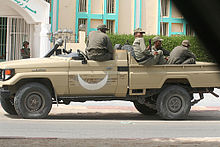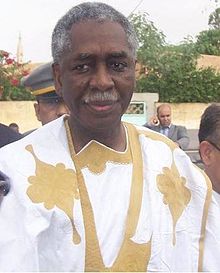Mohamed Ould Abdel Aziz
Mohamed Ould Abdel Aziz (Arabic: محمد ولد عبد العزيز, romanized: Muḥammad Wald 'Abd al-'Azīz; born 20 December 1956)[1] is a retired Mauritanian military officer and politician who served as the 8th President of Mauritania from 2009 to 2019.
He joined the Meknes Royal Military Academy in Morocco in 1977,[8] and, after a string of promotions, established the elite BASEP (Presidential Security Battalion).
[11] Western sources, citing Mohamed's background in coming from a traditionally favored Oulad Bou Sbaa Chorfa tribe,[12][13] questioned the general's commitment to democracy and reversing the history of ethnic and class inequities in the nation.
[14] Contrary to this, the Mauritanian press credited Mohamed for pushing to reduce military rule from 24 to 19 months and for attempting to limit voter fraud in the coming election.
[9] On 30 August 2007, President Sidi named Mohamed his Presidential Chief of Staff (Chef d'Etat-major particulier du Président de la République).
[17] General Mohamed was also commander of the forces sent to apprehend Group for Preaching and Combat militants who had killed four French tourists at Aleg in December 2007.
Mohamed remained both Advisor to the President and General, and was described as being at the nexus of "a small galaxy of other colonels, businessmen and politicians, in an uneasy balance.
At the end of June, the left-wing UFP party reported that they believed Mohamed and Ghazouani were planning for a coup, but were attempting a strategy of political change by hiving "independent" parliamentarians off from the government, which would replace the President peacefully.
[19] A mass defection in the ranks of the ruling PNDD-ADIL party on 4 August 2008 (two days before the coup) with 25 Parliamentary deputies and 23 senators was reported to have been inspired by military leaders,[20] and would have left the president unable to govern.
[3] Public reaction to the 2008 coup by western governments in the days after 6 August were hostile,[24] with particularly harsh condemnation coming from former colonial power and past economic supporter France.
[27] A Saudi-based newspaper claimed that the General was motivated by a combination of disgust at the corruption of those close to Abdallahi, but also over legal threats against Mohamed and others by the president regarding the behavior of the Mauritanian military during the mass expulsion of black Africans in 1989.
[28] Mohamed's initial list of names for the High Council of State included five civilians, released on 7 August along with a statement that former government ministers could retain their jobs.
[31][32][33][34] Two small demonstrations were held on the day following the coup: one opposing the seizure of power, which was dispersed by the police with tear gas, and one march supporting the military, at which Mohamed spoke.
[37][38] The Council stated that Mohamed had the power to appoint the prime minister, military officials and civil servants in Mauritania.
In contrast, the Algerian government has stridently opposed the coup, even while quietly receiving a visit from Mohamed's close ally and the new Mauritanian Chief of Armed Forces, Muhammad Ould Al-Ghazwani,[42] and has attempted to rally the African Union and Arab states against Abdelaziz.
[49] Despite this attempt to legitimize the post-coup government, the African Union carried out a sanctions regime first agreed on 22 December 2008, and continued to recognize Sidi Ould Cheikh Abdallahi as the Mauritanian Head of State.
[56] The country's Communications Minister, Hamdi Ould Mahjoub, reported that the president was shot in the arm, while Reuters medical sources said it was in the abdomen.
[69][70] On 23 June 2021, a prosecutor speaking on condition of anonymity and the spokesman of the former president's party Djibril Ould Bilal confirmed that a judge transferred Mohamed from house arrest to jail after he refused to cooperate with police.
[74] On 1 June 2022, the prosecutor ordered the referral of Mohamed to the Criminal Court on charges of corruption, money laundering, and illicit enrichment.
The court file estimated the sums embezzled by Mohamed at US$90 million; these assets consisted of 17 houses, 468 plots of land, several herds of sheep, and ougiya banknotes.




